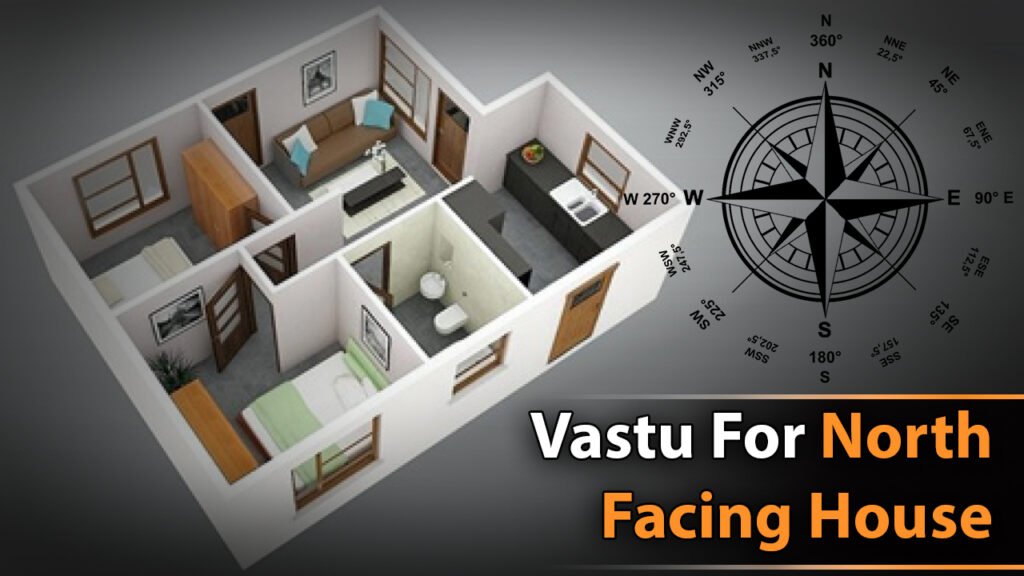Vastu for North Facing House
When it comes to designing and constructing a home, many people turn to Vastu Shastra—a traditional Indian architectural science that aims to harmonize human dwellings with natural energies. Among the various orientations, a north facing house is considered highly auspicious according to Vastu principles. This blog will delve into the significance of a north facing house.
Read blog on: Vastu For West Facing House
Why Choose a NorthFacing House?
In Vastu Shastra, the direction of a house plays a crucial role in determining the flow of energy and the overall wellbeing of its inhabitants. A north facing house is particularly favored because:
- Positive Energy Flow: The north direction is associated with the god Kubera, the deity of wealth and prosperity. It is believed that a north facing house attracts positive energy, enhancing financial stability and success.
- Natural Light: Houses facing north receive ample sunlight throughout the day, which helps in maintaining a bright and cheerful environment. Natural light is known to improve mood and productivity.
- Cooler Interiors: North Facing houses are generally cooler, especially in tropical climates, as they avoid direct exposure to the harsh afternoon sun. This makes them more comfortable to live in.
- Vastu Compliance: Many Vastu experts recommend north facing plots as they align well with Vastu principles, ensuring a balanced and harmonious living space.
Key Vastu Guidelines for North Facing Houses
To maximize the benefits of a north facing house, it’s essential to adhere to specific Vastu guidelines. Here are some important tips:
1. Entrance and Main Door
Location: The main entrance should ideally be in the north or northeast (Ishan) corner of the house. This placement ensures the inflow of positive energy and prosperity.
Design: The door should be well lit and welcoming. Avoid placing any obstructions like trees or poles directly in front of the entrance.
2. Living Room
Placement: The living room should be located in the northeast or north part of the house. This area is associated with peace and tranquility.
Furniture Arrangement: Keep the furniture lightweight and avoid clutter. Ensure that the seating arrangement promotes interaction and socializing.
3. Bedrooms
Master Bedroom: Ideally, the master bedroom should be in the southwest corner of the house. This placement provides stability and strength.
Other Bedrooms: Children’s bedrooms can be in the northwest or southeast corners. Avoid placing beds directly under beams or sloping ceilings.
4. Kitchen
Ideal Location: The kitchen should be in the southeast corner of the house, governed by the fire element. Alternatively, it can be placed in the northwest, but never in the northeast.
Cooking Stove: The cooking stove should face east while cooking. This ensures that the cook faces the rising sun, promoting health and vitality.
5. Puja Room
Best Direction: The puja room should be located in the northeast corner of the house, preferably on the ground floor. This area is considered sacred and conducive to spiritual practices.
Altar Placement: The altar should face east or west, allowing worshippers to face these directions during prayers.
6. Bathrooms and Toilets
Avoid Northeast: Bathrooms and toilets should not be located in the northeast corner, as this area is associated with purity and spirituality.
Preferred Locations: Place bathrooms in the northwest or southeast corners. Ensure proper ventilation and cleanliness.
7. Water Bodies
Placement: Water bodies like wells, borewells, or water tanks should be in the northeast corner. This enhances the flow of positive energy and prosperity.
Avoid South West: Never place water bodies in the southwest corner, as it can lead to financial instability.
8. Garden and Open Spaces
North and East: Maintain open spaces in the north and east directions. These areas should be free from heavy structures or tall trees.
Landscaping: Use plants and flowers to beautify the surroundings, but avoid thorny or poisonous plants.
Benefits of Following Vastu for North Facing Houses
Adhering to Vastu principles for a north facing house can bring numerous benefits:
- Enhanced Prosperity: Proper alignment and design can attract wealth and abundance.
- Improved Health: A well planned house promotes physical and mental well being.
- Harmonious Relationships: Balanced energy flow fosters better family relationships and social interactions.
- Career Growth: A Vastucompliant house can boost career prospects and professional success.
FAQs for Vastu for North Facing Houses
- Is it necessary to follow all Vastu guidelines strictly?
While adhering to Vastu principles can enhance the energy flow and overall harmony of a house, it is not mandatory to follow every guideline rigidly. Practical considerations, personal preferences, and modern lifestyle needs should also be taken into account. It’s often beneficial to consult a professional Vastu expert who can provide tailored advice based on your specific situation.
- Can I have a north facing house if my plot is irregularly shaped?
Yes, you can still benefit from a north facing house even if the plot is irregularly shaped. However, it’s crucial to ensure that the main entrance and key rooms are aligned according to Vastu principles. Consulting a Vastu expert can help optimize the layout for maximum benefits.
- What if my house already has some Vastu defects?
If your house has existing Vastu defects, there are several remedies you can apply to mitigate negative effects. These include using Vastu pyramids, mirrors, colors, and specific materials to correct imbalances. Again, consulting a Vastu expert can provide customized solutions.
- How does Vastu affect the resale value of a north facing house?
A Vastu compliant north facing house can potentially increase its resale value, as many buyers prefer homes that align with Vastu principles. Properties that adhere to Vastu guidelines are often perceived as more auspicious and desirable.
- Are there any specific colors recommended for a north facing house?
Yes, certain colors are recommended to enhance the positive energy in a north facing house. Light shades like white, cream, and pastel colors are ideal for walls, as they reflect light and create a serene atmosphere. Earthy tones can be used for furniture and decor to maintain balance.
- Can Vastu principles be applied to apartments and flats?
Absolutely! Vastu principles can be effectively applied to apartments and flats, although some adjustments may be necessary due to space constraints. Focus on optimizing the layout within the available space, ensuring that key areas like the entrance, living room, and bedrooms align with Vastu guidelines.
If you want to watch Astrology Videos visit our YouTube channel: Acharya Ganesh
Conclusion of Vastu for North Facing House
A north facing house offers numerous advantages when designed and constructed according to Vastu Shastra principles. By paying attention to the placement of key areas, maintaining open spaces, and incorporating appropriate colors and materials, you can create a harmonious and prosperous living environment. Whether you’re building a new home or renovating an existing one, following Vastu guidelines can significantly enhance your quality of life.
Remember, Vastu is not about rigid rules but about creating a balanced and positive living space that supports your wellbeing and success.

